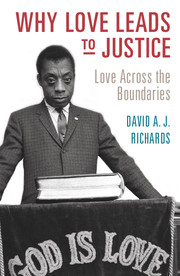Book contents
- Frontmatter
- Dedication
- Epigraph
- Content
- Acknowledgments
- Introduction: Love Resists Injustice
- 1 Breaking the Love Laws as Resistance
- 2 Benjamin Britten and Peter Pears: Love and Resistance
- 3 Christopher Isherwood's Struggle for a Resistant Voice
- 4 Wystan Auden on the Anxiety of Manhood
- 5 Bayard Rustin on Nonviolence
- 6 James Baldwin on Love and Voice
- 7 Eleanor Roosevelt, Margaret Mead, and Ruth Benedict on Resisting Patriarchy
- Conclusion: Moral Injury and Love: Why Love Leads to Justice
- Bibliography
- Index
2 - Benjamin Britten and Peter Pears: Love and Resistance
Published online by Cambridge University Press: 05 November 2015
- Frontmatter
- Dedication
- Epigraph
- Content
- Acknowledgments
- Introduction: Love Resists Injustice
- 1 Breaking the Love Laws as Resistance
- 2 Benjamin Britten and Peter Pears: Love and Resistance
- 3 Christopher Isherwood's Struggle for a Resistant Voice
- 4 Wystan Auden on the Anxiety of Manhood
- 5 Bayard Rustin on Nonviolence
- 6 James Baldwin on Love and Voice
- 7 Eleanor Roosevelt, Margaret Mead, and Ruth Benedict on Resisting Patriarchy
- Conclusion: Moral Injury and Love: Why Love Leads to Justice
- Bibliography
- Index
Summary
The Bloomsbury Group's acceptance of gay/lesbian love and their anti-imperialism informed the gradual liberalization of British and American public opinion and law after World War II. We explore here how breaking the Love Laws related to the comparable resistance of four gay British men – Benjamin Britten, Peter Pears, Christopher Isherwood, and Wystan Auden – who come to young manhood after the Bloomsbury Group. They were, however, certainly influenced by them – Virginia Woolf, as we shall see, and, notably, the novelist E. M. Forster. Forster was a friend of and major influence on Isherwood (indeed, shared with Isherwood and sought his comments on his only explicitly gay novel, Maurice, published after Forster's death). He collaborated with Benjamin Britten on the libretto for Britten's exploration of repressed gay love in his opera, Billy Budd, Britten's most explicitly gay work until his final opera, Death in Venice.
What makes these four particular gay men – a composer, a singer, a novelist, and a poet – of interest is that their resistance leads to forms of art that in various ways contest homophobia, breaking the silencing of voice on which homophobia rests. During the 1930s, they are good friends and supporters of one another, indeed embedded in a web of relationships so close – as gay men and artists – that any fair study of any of them must include the others. The love story of Benjamin Britten and Peter Pears, the subject of this chapter, arises within this web of such friendship, a relational web that frames the later divergences among these friends, including, in the case of Britten and Auden, the breaking of their friendship, very much linked to their quite different erotic choices and love stories. Creativity, friendship, and love are often intimately connected, and, when they are, we cannot fairly discuss one without the other. Consider, in the United States, the comparable friendships among the gay poet, Allen Ginsberg, and the gay novelist, William Burroughs, and the bisexual novelist, Jack Kerouac, whose creative support for one another was indispensable in their artistic development and love stories. My argument here begins by setting the stage for exploring the later love stories of two of the artists I study (Isherwood and Auden) in the next two chapters, and the love story of Britten and Pears here.
- Type
- Chapter
- Information
- Why Love Leads to JusticeLove across the Boundaries, pp. 31 - 72Publisher: Cambridge University PressPrint publication year: 2015



